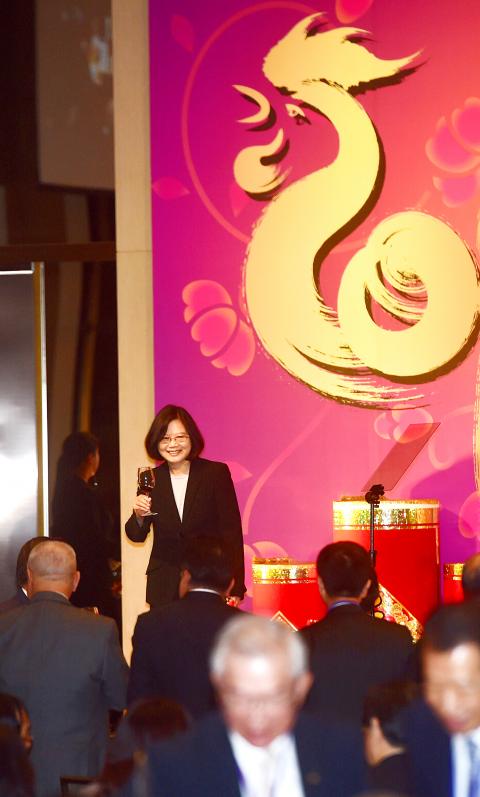President Tsai Ing-wen (蔡英文) yesterday encouraged China-based Taiwanese businesspeople to return to and invest in their home nation, while calling for a new mindset and way of doing things in cross-strait interactions.
Tsai made the remarks in a speech at a Lunar New Year gathering in Taipei with China-based Taiwanese businesspeople organized by the Straits Exchange Foundation.
“I learned from the Straits Exchange Foundation that some of our Taiwanese businesspeople belonging to the Association of Taiwan Investment Enterprises on the Mainland are planning to return home and invest in the Sanyi Wood Sculpture Park in Miaoli County’s Sanyi Township (三義),” Tsai said.

Photo: Chien Jung-fong, Taipei Times
They intend to build sculpture schools and tourism factories, as well as expand the Sanyi Wood Sculpture Museum, in an effort to promote the town’s tourism industry and facilitate its industrial upgrade, Tsai said.
Praising the idea, Tsai said that the government would be more than willing to provide its full support and assistance to businesspeople returning home.
Turning to the state of cross-strait relations, Tsai said the development of economic ties over the past three decades has had a profound influence on the lives of people on both sides of the Taiwan Strait.
“However, amid a new international environment and the growing economic ties between the two sides, which have seen mutual interests and room for cooperation in economic and regional development, we need to jointly create a new cross-strait interaction model, with a new mindset and a new way of doing things,” she said.
“Only by doing so can we respond to the shared expectation of people on both sides of the Strait and in the [Asia-Pacific] region for peace,” she added.
Her administration is willing to demonstrate its greatest goodwill, and engage in a genuine dialogue and negotiation with Beijing, to create a benign and mutually beneficial economic partnership, Tsai said.
“We also call on Beijing to deal with the various problems and difficulties faced by Taiwanese businesspeople and safeguard their legal rights, free of any political intervention,” she said.
The speech was Tsai’s latest effort to extend an olive branch to China, despite her administration’s reluctance to accept the so-called “1992 consensus.”
The “1992 consensus” — a term former Mainland Affairs Council chairman Su Chi (蘇起) said in 2006 that he had made up in 2000 — refers to a tacit understanding between the Chinese Nationalist Party (KMT) and the Chinese government that both sides acknowledge there is “one China,” with each side having its own interpretation of what “China” means.
After the gathering, the honorary chairman of the association, Kuo Shan-hui (郭山輝), quoted Tsai as saying that the government plans to table a new cross-strait policy to resolve the stalemate, probably later this year.
“However, given that no breakthrough would be seen regarding [Beijing’s] precondition on the ‘one China’ principle and the ‘1992 consensus,’ the current obstacles and deadlock across the Taiwan Strait could continue,” Kuo said.
Asked about the reduced attendance at yesterday’s gathering compared with previous years, Kuo said it was due to businesspeople’s concerns about the government’s efforts to promote cross-strait ties, not the result of political pressure from Beijing.
Additional reporting by CNA

SECURITY: As China is ‘reshaping’ Hong Kong’s population, Taiwan must raise the eligibility threshold for applications from Hong Kongers, Chiu Chui-cheng said When Hong Kong and Macau citizens apply for residency in Taiwan, it would be under a new category that includes a “national security observation period,” Mainland Affairs Council (MAC) Minister Chiu Chui-cheng (邱垂正) said yesterday. President William Lai (賴清德) on March 13 announced 17 strategies to counter China’s aggression toward Taiwan, including incorporating national security considerations into the review process for residency applications from Hong Kong and Macau citizens. The situation in Hong Kong is constantly changing, Chiu said to media yesterday on the sidelines of the Taipei Technology Run hosted by the Taipei Neihu Technology Park Development Association. With

CARROT AND STICK: While unrelenting in its military threats, China attracted nearly 40,000 Taiwanese to over 400 business events last year Nearly 40,000 Taiwanese last year joined industry events in China, such as conferences and trade fairs, supported by the Chinese government, a study showed yesterday, as Beijing ramps up a charm offensive toward Taipei alongside military pressure. China has long taken a carrot-and-stick approach to Taiwan, threatening it with the prospect of military action while reaching out to those it believes are amenable to Beijing’s point of view. Taiwanese security officials are wary of what they see as Beijing’s influence campaigns to sway public opinion after Taipei and Beijing gradually resumed travel links halted by the COVID-19 pandemic, but the scale of

A US Marine Corps regiment equipped with Naval Strike Missiles (NSM) is set to participate in the upcoming Balikatan 25 exercise in the Luzon Strait, marking the system’s first-ever deployment in the Philippines. US and Philippine officials have separately confirmed that the Navy Marine Expeditionary Ship Interdiction System (NMESIS) — the mobile launch platform for the Naval Strike Missile — would take part in the joint exercise. The missiles are being deployed to “a strategic first island chain chokepoint” in the waters between Taiwan proper and the Philippines, US-based Naval News reported. “The Luzon Strait and Bashi Channel represent a critical access

Pope Francis is be laid to rest on Saturday after lying in state for three days in St Peter’s Basilica, where the faithful are expected to flock to pay their respects to history’s first Latin American pontiff. The cardinals met yesterday in the Vatican’s synod hall to chart the next steps before a conclave begins to choose Francis’ successor, as condolences poured in from around the world. According to current norms, the conclave must begin between May 5 and 10. The cardinals set the funeral for Saturday at 10am in St Peter’s Square, to be celebrated by the dean of the College